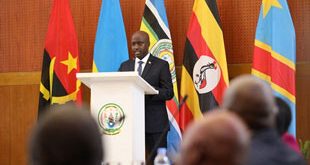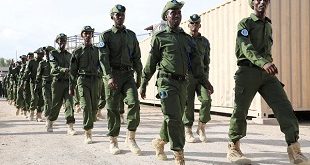
Nairobi, Kenya | AFP | The small, central African country of Burundi is one of the poorest in the world, with a history of political crises and ethnic massacres and a long civil war.
Here are some key facts about the nation of 11 million people ahead of its May 20 first round presidential election.
– Third poorest in world –
Landlocked and situated in Africa’s Great Lakes region, Burundi is one of the continent’s smallest nations at 27,834 square kilometres (10,747 square miles), and one of its most densely populated.
Green and fertile, it is nevertheless one of the three poorest countries in the world, with 75 percent of its population living below the poverty line, according to the World Bank.
The UN’s Food and Agriculture Organization estimates 1.7 million are in chronic severe food insecurity.
Very mountainous, it often suffers from landslides.
Farming forms the backbone of the economy, with coffee and tea employing 80 percent of the population and accounting for 40 percent of gross domestic product.
Burundi has rare earth minerals essential to technological and military products.
The political capital is Gitega and the economic capital Bujumbura.
– Massacres, coups, war –
Ethnic Hutus make up 85 percent of the population and Tutsis 14 percent.
Tensions between Hutus and Tutsis have boiled over repeatedly since independence from former colonial power Belgium in 1962.
In 1972 a failed Hutu-led uprising against the Tutsi-dominated leadership sparked a wave of massacres of Hutus, which left, according to different estimates, between 100,000 and 300,000 dead.
In 1976 a military coup brought Jean-Baptiste Bagaza to power. In 1987 he was overthrown and Pierre Buyoya, another Tutsi military officer, became head of state.
In 1988 new massacres left between 5,000, according to an official toll, and 50,000 dead.
The assassination in 1993 of first Hutu president, Melchior Ndadaye, in a coup fomented by Tutsi soldiers triggered a civil war between the Tutsi-dominated army and Hutu rebels.
The civil war lasted until 2006 despite several peace deals, notably one signed in Tanzania in 2000, several years before the two main rebel groups laid down arms.
The war left nearly 300,000 dead, mainly civilians, and it ruined the economy.
– Political crisis –
Burundi, ruled since 2005 by former Hutu rebel chief Pierre Nkurunziza, has been mired in political crisis since he announced in 2015 that he would run for a third term.
The opposition said this would violate the constitution and jeopardise deals ending the civil war.
A clampdown on demonstrations and Nkurunziza’s re-election that year failed to stem violence and massive rights abuses intensified.
Around 1,200 were killed and more than 400,000 displaced up to May 2017, according to the International Criminal Court (ICC), which has launched an investigation into suspected crimes against humanity.
In 2018 Nkurunziza surprised observers by announcing he would not stand in the forthcoming election.
Burundi is listed 160th out of 180 countries for press freedom by Reporters Without Borders.
– Celebrated novel –
The novel “Small Country” by Franco-Rwandan novelist and rapper Gael Faye, about a boy in Bujumbura whose carefree life is devastated by the civil war, has received several literary prizes and been translated into nearly 40 languages.
The release of a film version has been delayed by the coronavirus epidemic
 The Independent Uganda: You get the Truth we Pay the Price
The Independent Uganda: You get the Truth we Pay the Price



